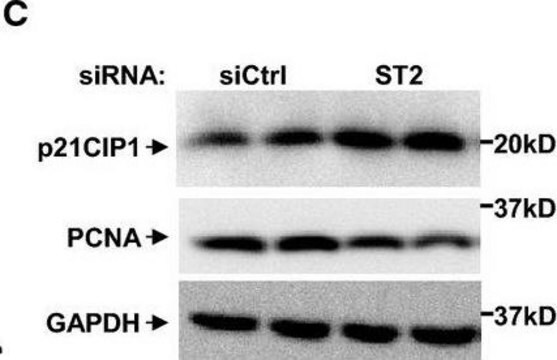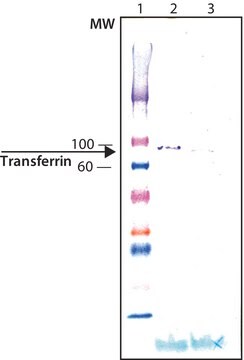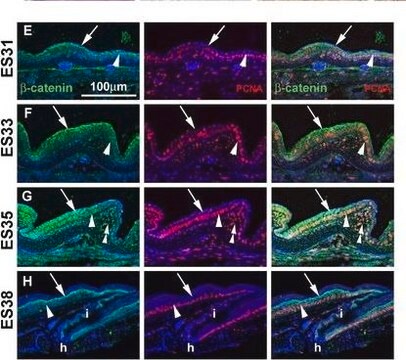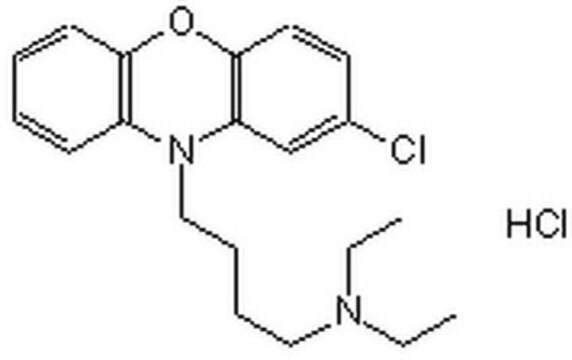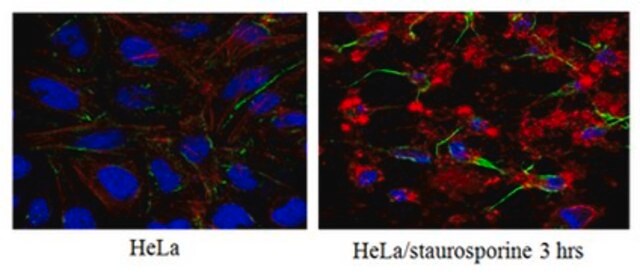05-347
Przeciwciało anty-PCNA, klon PC10
clone PC10, Upstate®, from mouse
About This Item
Polecane produkty
pochodzenie biologiczne
mouse
Poziom jakości
forma przeciwciała
culture supernatant
rodzaj przeciwciała
primary antibodies
klon
PC10, monoclonal
reaktywność gatunkowa
vertebrates
producent / nazwa handlowa
Upstate®
metody
immunocytochemistry: suitable
immunohistochemistry: suitable
western blot: suitable
izotyp
IgG2aκ
numer dostępu NCBI
numer dostępu UniProt
Warunki transportu
wet ice
docelowa modyfikacja potranslacyjna
unmodified
informacje o genach
human ... PCNA(5111)
Opis ogólny
Specyficzność
Immunogen
Zastosowanie
Epigenetyka i funkcje jądrowe
Cykl komórkowy, replikacja i naprawa DNA
Jakość
Opis wartości docelowych
Postać fizyczna
Przechowywanie i stabilność
Komentarz do analizy
Pozytywna kontrola antygenu: Katalog #12-301, niestymulowany lizat komórek A431. Dodać 2,5 µl 2-merkaptoetanolu/100 µl lizatu i gotować przez 5 minut w celu zredukowania preparatu. Załadować 20 µg zredukowanego lizatu na pas do minigelów.
Informacje prawne
Oświadczenie o zrzeczeniu się odpowiedzialności
Nie możesz znaleźć właściwego produktu?
Wypróbuj nasz Narzędzie selektora produktów.
Kod klasy składowania
12 - Non Combustible Liquids
Klasa zagrożenia wodnego (WGK)
WGK 2
Temperatura zapłonu (°F)
Not applicable
Temperatura zapłonu (°C)
Not applicable
Certyfikaty analizy (CoA)
Poszukaj Certyfikaty analizy (CoA), wpisując numer partii/serii produktów. Numery serii i partii można znaleźć na etykiecie produktu po słowach „seria” lub „partia”.
Masz już ten produkt?
Dokumenty związane z niedawno zakupionymi produktami zostały zamieszczone w Bibliotece dokumentów.
Nasz zespół naukowców ma doświadczenie we wszystkich obszarach badań, w tym w naukach przyrodniczych, materiałoznawstwie, syntezie chemicznej, chromatografii, analityce i wielu innych dziedzinach.
Skontaktuj się z zespołem ds. pomocy technicznej
